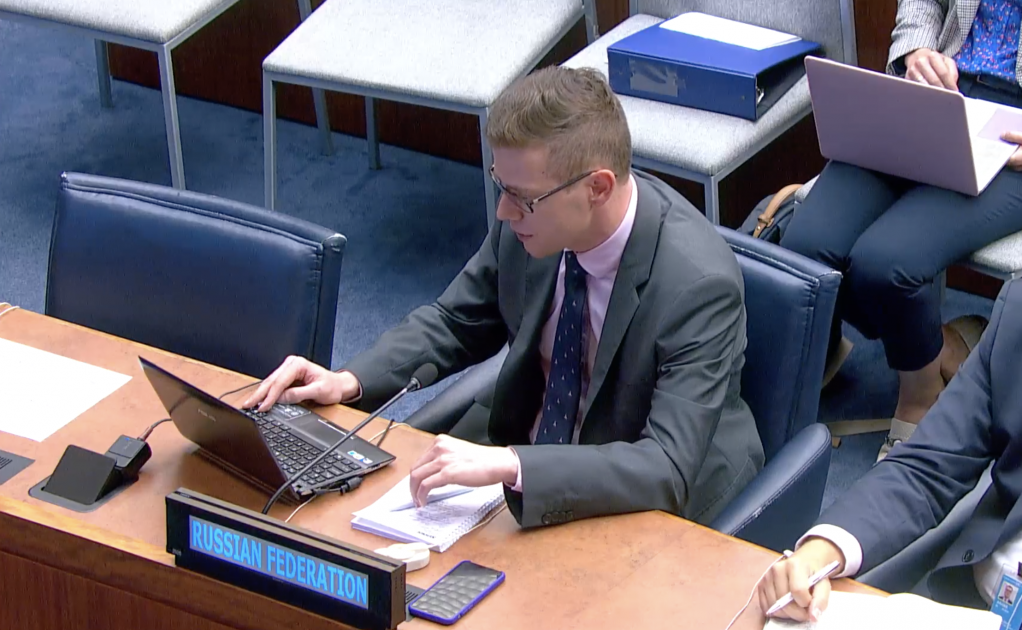Right of Reply by Konstantin Vorontsov, Deputy Head of the Russian Delegation, at the General Debate in the First Committee of the 78th session of the UNGA
Mr. President,
The particular attention on the part of EU delegations who dedicate large parts of their statements to Russia is flattering. However, it seems to mean only one thing: EU states are just missing bilateral contacts with our country. To address the problems they try to raise, we use multilateral fora, such as the platform of the UN General Assembly.
Just as our Belarusian friends, we feel compelled to respond to provocative statements by some Western states in the context of Russia-Belarus military and nuclear cooperation. On the one hand, coming from representatives of NATO member states, such allegations are so obviously misplaced, that they require no further explanations. On the other hand, it would be wrong not to comment on such a glaring and telling example of behavior based on double standards when one sees the speck in one’s brother's eye but falls to notice the beam in one’s own eye.
In reality, it is the NATO members states who have been pursuing the destabilizing policy in this field for many years – the once who have proclaimed themselves a “nuclear alliance”. For decades, members of the NATO have been developing the so-called “nuclear sharing” arrangements. This practice bases on US nuclear weapons deployed at six military facilities in five countries on the European continent which the US is not a part of. The nuclear weapon kept by Washington on the forefront bases thousands of kilometers away from its national territory and undergoing constant modernization, is capable of being used promptly to strike an ever-growing range of strategic targets in the territories of Russia and Belarus.
Moreover, they make no secret of the fact that those are the tasks they train for during respective military exercises involving second-tier NATO states that are ready to provide air support and cover for US nuclear weapon delivery platforms. Almost all members of the alliance are involved in immediate planning of the use of nuclear weapons.
The factor of “nuclear sharing” has acquired particular importance under the current circumstances when Russia has to take into account the sharp escalation of threats associated with the policy of the West aimed at inflicting a “strategic defeat” on our country while balancing on the brink of direct military confrontation between the nuclear powers. Our closest allies in Belarus also face a growing politico-military pressure from the US and NATO, in particular due to the efforts of the countries sharing the border with the Union State, some of which have long been seeking a deployment of parts of US nuclear arsenal in their territory.
For a long time, we demonstrated restraint. For years, we tried to persuade Washington to follow our example and return all of its nuclear weapons to its national territory. It was all in vain. So, we had to act in a different way.
The response measures taken by Russia and Belarus are of exclusively forced and retaliatory nature. They strictly fit into the concept of deterrence and are targeted steps of a scale incommensurable with NATO practices, that are implemented in the territory of two brotherly states building the Union State that forms a common defense space.
Raising the issue of Russia and Belarus reconsidering their joint decisions in the nuclear field is totally unrealistic unless the US and NATO abandon their harmful policy aiming to deliberately undermine our security and the US fully withdraws its nuclear weapons from Europe and eliminates the related infrastructure.
As for insinuations of the Western states that the 1994 Budapest Memorandum is being violated in this context, we simply see no subject for a serious debate, but rather an artificial attempt to find another pretext for allegations serving propagandistic purposes. We believe it would be sufficient to limit our remarks to recalling that the Budapest Memorandum was an element in the process aimed at ensuring successful accession of Belarus to the NPT as a non-nuclear state. There are no doubts that the country keeps this status until these days. It is the Russian Federation that exercises full control over the nuclear weapons.
Thank you.
